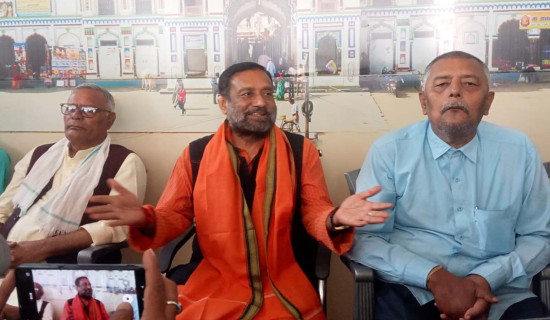- Friday, 27 February 2026
Local Polls: Outcome And Message
Every election comes with surprises and shocks. As the elections provide citizens an opportunity to express their inner voice through ballots in five years, they never hesitate to stand against the status quo. This year’s local election has also delivered sensational outcomes. Voters in Kathmandu Metropolitan City, the country’s political heartland, have showed their clear disdain for partycracy that tends to undermine popular sovereignty. They voted for an independent candidate and punished mainstream parties for their patronage-based political behaviour and failure to deliver on their promises. This trend is also evident in some other important cities across the country.
Independent candidate Balen Sah, who is poised to become a mayor of Kathmandu Metropolitan City, has become a political sensation all of a sudden. His rapper background enabled him to communicate with a large number of youths fed up with traditional political leadership. As a structural engineer, he rolled out development vision for the capital city, drawing the attention of cross-section of population. Ever-spreading digital and social media gave him an effective platform to reach out to diverse segments of people.
Wake-up call
With the information revolution, the citizens have been so empowered that they no longer need political parties to channel their aspirations and demands. Politics has become personal, substituting the party as an agency to bridge between the government and people. This has indeed brought a crisis to the relevance of parties globally. When the citizens get frustrated with underperforming political parties, they turn to alternative forces or figures to come out of the rut. The craze particularly of young people towards Balen Sah is a wake-up call for the parties for their reform and democratisation.
Meanwhile, the local poll has dealt a big blow to the main opposition CPN-UML. Owing to the party’s vertical split and five-party’s electoral alliance, the UML has not only lost a record number of local levels but is also ousted from the leadership of metropolises that will surely hurt its prospect in provincial and federal polls due later this year. Ruling Nepali Congress became the biggest beneficiary of the electoral alliance after it emerged the largest party from the polls. The CPN-Maoist Centre did not only retain its third position but also improved on its electoral performance, winning more than a dozen additional local units.
While the NC and Maoist Centre leaders are puffing up the success of alliance, its two constituents – Janata Samajbadi Party (JSP) and CPN-Unified Socialist – have lamented that they did not benefit much from the alliance. JSP and Unified Socialist have become fourth and fifth force from the polls respectively. Given its strength in federal and provincial legislatures, the newly formed Unified Socialist is unable to bag expected seats but its victory in mayoral posts in Pokhara Metropolitan City and Hetauda Sub-Metropolitan City has given it much-needed boost, which it can capitalise on expanding organisation base and increase its stakes in the upcoming elections. It has inflicted a humiliating defeat on the UML, its sworn-enemy, in both cities.
With moderate victory, the Unified Socialist has averted its potential existential crisis, dismissing a hypothesis that a splinter party gradually peters out over the years. Even if it failed to garner impressive number of seats, it played a critical role in defeating the UML in many places, which was its main political mission. Unless the UML realises that the party split was the main factor behind its huge loss, it will further suffer in the next polls. Deflated by the election debacle, the UML has decided to end its 9-month-long obstruction in the House of Representatives (HoR) and recognised the Unified Socialist as a political party. One UML leader went on to say that there was no rationale to continuously disrupt the parliament over its demand to sack 14 Unified Socialist lawmakers since the people have acknowledged its very existence.
Diversity
The local election has rejected the UML’s claim that the country will move on the path of two-party model. It is bizarre that the UML, whose guiding principle is based on ‘People’s Multiparty Democracy,’ is vouching for the Anglo-Saxon capitalist model of two-party system. In a country where social, cultural and ethnic diversities exist, the two-party system does not give alternatives to the people. Political scientists argue that two-party system functions well where society has been crystallised into two ideologies, two classes and two educational systems. It is not essentially bad but it simply does not represent, articulate and mediate cross-cutting interests and values of the Nepali society. With the rise of Maoist Centre as the decisive third force, the NC and the UML have to muster its support for electing their candidates vying for the post of president, vice-president and members of National Assembly.
The poll results show the five-party alliance has swept through in most of the places though it had forged alliance only in one-third of them. It would have hit big if the alliance had been made in other local units by recognising the local reality and spirit of local leadership. Nonetheless, the political parties should read new trends and the message manifested by the local poll. Why are independent candidates more popular than that of parties? Why did the voter turnout drop this time as compared with that of local polls held in 2017? Why did the people vote for new faces and dump the old ones? The political parties should take their cue from these developments and take bold measures to sort out the organisational and leadership deficiencies.
(The author is Deputy Executive Editor of the daily.)

















